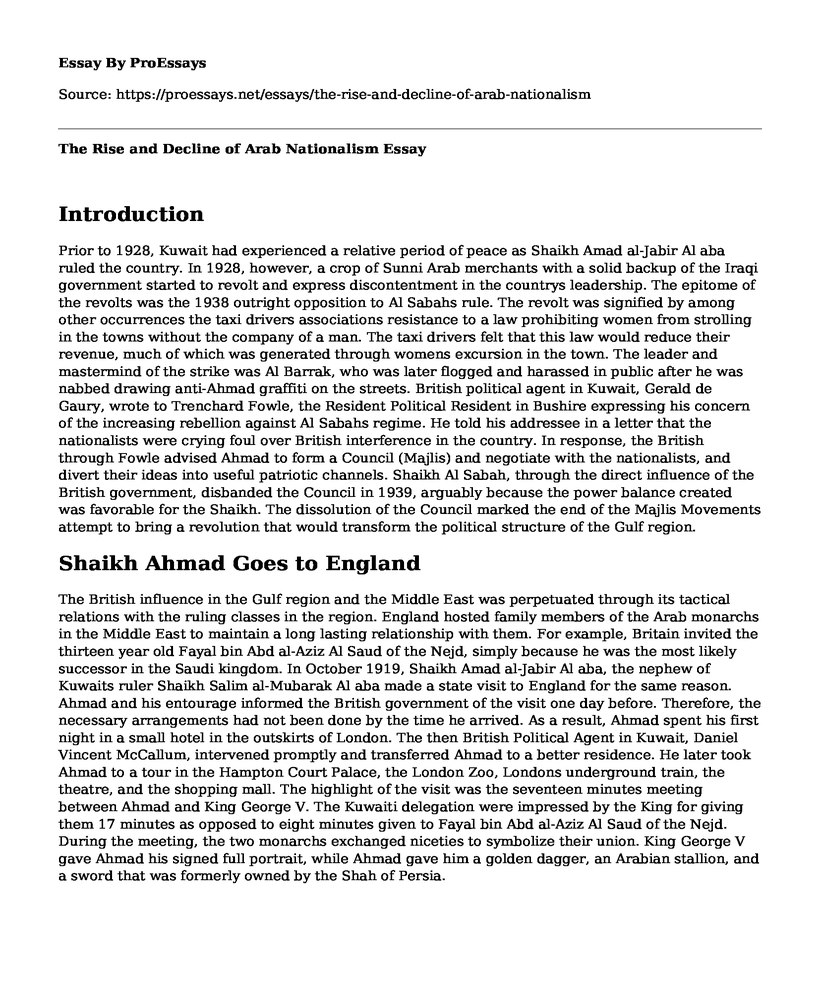Introduction
Prior to 1928, Kuwait had experienced a relative period of peace as Shaikh Amad al-Jabir Al aba ruled the country. In 1928, however, a crop of Sunni Arab merchants with a solid backup of the Iraqi government started to revolt and express discontentment in the countrys leadership. The epitome of the revolts was the 1938 outright opposition to Al Sabahs rule. The revolt was signified by among other occurrences the taxi drivers associations resistance to a law prohibiting women from strolling in the towns without the company of a man. The taxi drivers felt that this law would reduce their revenue, much of which was generated through womens excursion in the town. The leader and mastermind of the strike was Al Barrak, who was later flogged and harassed in public after he was nabbed drawing anti-Ahmad graffiti on the streets. British political agent in Kuwait, Gerald de Gaury, wrote to Trenchard Fowle, the Resident Political Resident in Bushire expressing his concern of the increasing rebellion against Al Sabahs regime. He told his addressee in a letter that the nationalists were crying foul over British interference in the country. In response, the British through Fowle advised Ahmad to form a Council (Majlis) and negotiate with the nationalists, and divert their ideas into useful patriotic channels. Shaikh Al Sabah, through the direct influence of the British government, disbanded the Council in 1939, arguably because the power balance created was favorable for the Shaikh. The dissolution of the Council marked the end of the Majlis Movements attempt to bring a revolution that would transform the political structure of the Gulf region.
Shaikh Ahmad Goes to England
The British influence in the Gulf region and the Middle East was perpetuated through its tactical relations with the ruling classes in the region. England hosted family members of the Arab monarchs in the Middle East to maintain a long lasting relationship with them. For example, Britain invited the thirteen year old Fayal bin Abd al-Aziz Al Saud of the Nejd, simply because he was the most likely successor in the Saudi kingdom. In October 1919, Shaikh Amad al-Jabir Al aba, the nephew of Kuwaits ruler Shaikh Salim al-Mubarak Al aba made a state visit to England for the same reason. Ahmad and his entourage informed the British government of the visit one day before. Therefore, the necessary arrangements had not been done by the time he arrived. As a result, Ahmad spent his first night in a small hotel in the outskirts of London. The then British Political Agent in Kuwait, Daniel Vincent McCallum, intervened promptly and transferred Ahmad to a better residence. He later took Ahmad to a tour in the Hampton Court Palace, the London Zoo, Londons underground train, the theatre, and the shopping mall. The highlight of the visit was the seventeen minutes meeting between Ahmad and King George V. The Kuwaiti delegation were impressed by the King for giving them 17 minutes as opposed to eight minutes given to Fayal bin Abd al-Aziz Al Saud of the Nejd. During the meeting, the two monarchs exchanged niceties to symbolize their union. King George V gave Ahmad his signed full portrait, while Ahmad gave him a golden dagger, an Arabian stallion, and a sword that was formerly owned by the Shah of Persia.
Cite this page
The Rise and Decline of Arab Nationalism. (2021, Mar 31). Retrieved from https://proessays.net/essays/the-rise-and-decline-of-arab-nationalism
If you are the original author of this essay and no longer wish to have it published on the ProEssays website, please click below to request its removal:
- Why Does Empire Need Both Corruption and Generation? Essay Example
- Advantages and Disadvantages of Making Policies that Fund Scientific Research
- Paper Example on Interrogations in Guantanamo
- Research Paper on Corruption and Deviance in Policing
- Civil War Improved US Living Standards: Essay Sample on Hospitals & Ambulance
- Uncle Tom's Cabin: Christianity, Slavery & Women's Revolution - Essay Sample
- Essay Example on Amazon's Expansion: Government Regulations & Challenges







